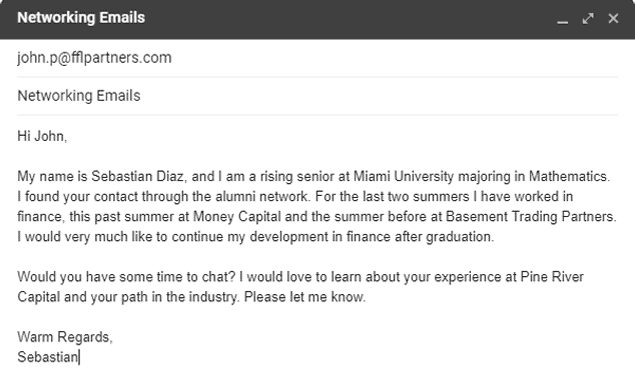Email Etiquette
Email is the primary form of communication in finance. It is crucial that when you email you follow a standard format and do not make silly mistakes. Many people have different backgrounds and communicate in different ways, but this section will guide you on how to email in a way that prevents you from sending anything controversial.
Click on the picture to download some sample emails. These can serve as a guide on what to say in various scenarios. These are real emails that we have sent. Please refrain from copying them exactly, use them as a guide on how you should write an email.

Email Commandments
1. Send Thank You Emails
Always send a thank you email after a phone call, coffee chat, or interview (in-person or online). Send a separate email to each person that you talked to. Don’t just copy and paste emails; each email should be unique. Try to reference something you talked about in the body; this is especially effective if you resonated with your contact on a specific topic. Send the thank you email the same day as your interview. Don’t send it 5 minutes after your interview, but don’t wait until the next day either.
2. List Multiple Items In Bullet Form
Interviewers will often ask you for time slots or something else. Whenever you have to give a list of items, present them in bullet form. It is easier to read and makes you look professional.
3. Check Your Spelling
Always check your spelling. Having a name or word misspelled is an easy way to lose credibility or a potential offer. It never feels good making a simple mistake like this, so spend the extra couple seconds just proofreading your email before you hit send.
4. Add A Signature To Your Email
It is common for every email in finance to have some sort of signature. People need to be able to get your contact information at the tap of a button. Put, at the minimum, your email and phone number in your signature. Some people put their LinkedIn in the signature, but refrain from including extraneous details like your mailing address. You want your signature to look clean and simple.
5. Don’t Use “Dear” or “Hey”
Although finance is very formal and hierarchical, at the end of the day it is just a group of normal people working together. Everybody just wants to feel normal. Using “Dear X” to start off your email to somebody is too formal and just plain weird. Just say “Hi John” or “John.” Do not use “Hey” either; it is too informal.
6. Respond Promptly To Emails
The rule when working in finance is that you need to respond to emails within 15 minutes. That isn’t the case for college students interviewing; however, responding as quickly as you can makes you look on top of your game and gives a nice impression. Don’t wait more than 12 hours to respond. There is no excuse for delaying an email: you have a smartphone on you that you probably check every 5 minutes.
7. Be Polite And Courteous
This is pretty straightforward. You are most likely in the position that you need something, whether that is a job, an internship, a coffee chat, or some advice. Don’t be rude, demanding, or inconsiderate. Be humble, kind, and thankful. People in finance don’t have a lot of free time and you should be considerate that he/she is taking time out of his/her day to email you.
8. Make Sure The Name And Company Are Correct
There is no worse blunder than putting the wrong name or company of the person you are emailing. We have made that mistake and it is not fun. You will look silly and the person you are emailing will immediately delete your message or call you out on your mistake. Proofread your email to make sure you don’t make this error.
9. Try To Personalize The Message
Most people write generic emails, including the usual phrases such as, “Thank you for taking the time to speak with me” or “Looking forward to chatting in the future.” These are important to include in your message; however, by including something personal and unique in the email you can really stand out and make sure you are remembered. Include something you talked about in the interview or some mutual interest you share.
10. Don’t Make The Ask Right Away
For most emails, the end goal is to hopefully get an internship or job. Don’t ask for that right away; ease into the ask, and make sure you’re asking them insightful questions about topics outside the recruiting process. Get to know the person you reached out to by having an informational call or getting coffee with them. Imagine if on the first date you asked a person to marry you, it would be weird and he/she would say no. Obviously this process is not that extreme, but treat it in a similar manner.



